- Nuestra investigación
- Artículo
- Lectura de 6 minutos
- Last Updated: 03/28/2024
The Future of First Impressions: Embracing AI in HR for Better Onboarding
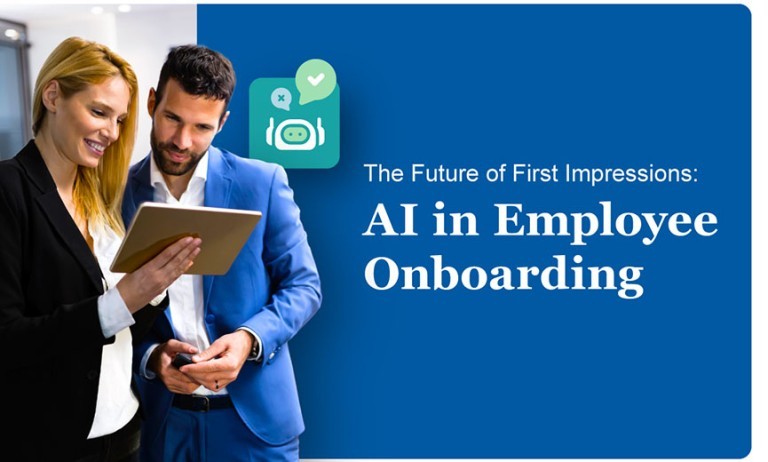
Table of Contents
As technology reshapes onboarding experiences, both companies and recent hires are navigating this new terrain. What’s the impact of artificial intelligence (AI) on new hire onboarding and human resources (HR) professionals? What challenges do businesses and HR leaders face when integrating new technology into onboarding? What insights can we glean from the perspectives of recent hires onboarded, both with and without AI, regarding the future of first impressions?
We surveyed 309 HR professionals and 1,003 recent hires to uncover how technology impacts the hiring and onboarding process. We provide data-driven insights on how HR professionals can utilize AI to provide a better onboarding experience based on recent hire feedback and, in turn, help improve retention.
Key Takeaways
- 48% of new hires surveyed describe their post-onboarding training as somewhat inadequate.
- Nearly 3 in 10 employees dissatisfied with their onboarding experience plan to look for a new job within the next three months.
- AI-onboarded employees are 30% less likely to quit within a year than those onboarded without AI.
- 65% of HR professionals surveyed believe using AI in onboarding will improve employee retention.
New Hires Weigh In
Recently hired employees we surveyed point to a need for improved onboarding. They suggested how HR professionals can help fix the onboarding process to enhance employee experience and retention.

More than half of employees surveyed found their post-onboarding training to be at least somewhat inadequate. Three in 10 of those who were dissatisfied with their onboarding plan to seek new employment within the next three months. There is a strong desire among newly hired employees to enhance what they feel is a flawed onboarding experience. HR professionals can use this as a lesson learned that their company’s onboarding experience can significantly impact employee retention. It underscores the importance of HR professionals continuously evaluating and implementing employee feedback to onboarding and training methods.
Surveyed employees onboarded with the help of AI are 30% less likely to quit within their first year, and 85% of digitally onboarded hires also report satisfaction with their onboarding experience. This reinforces that AI may enhance the process of starting a new job. HR pros’ sentiments also mirror this, and 65% believe using AI in onboarding will improve employee retention.
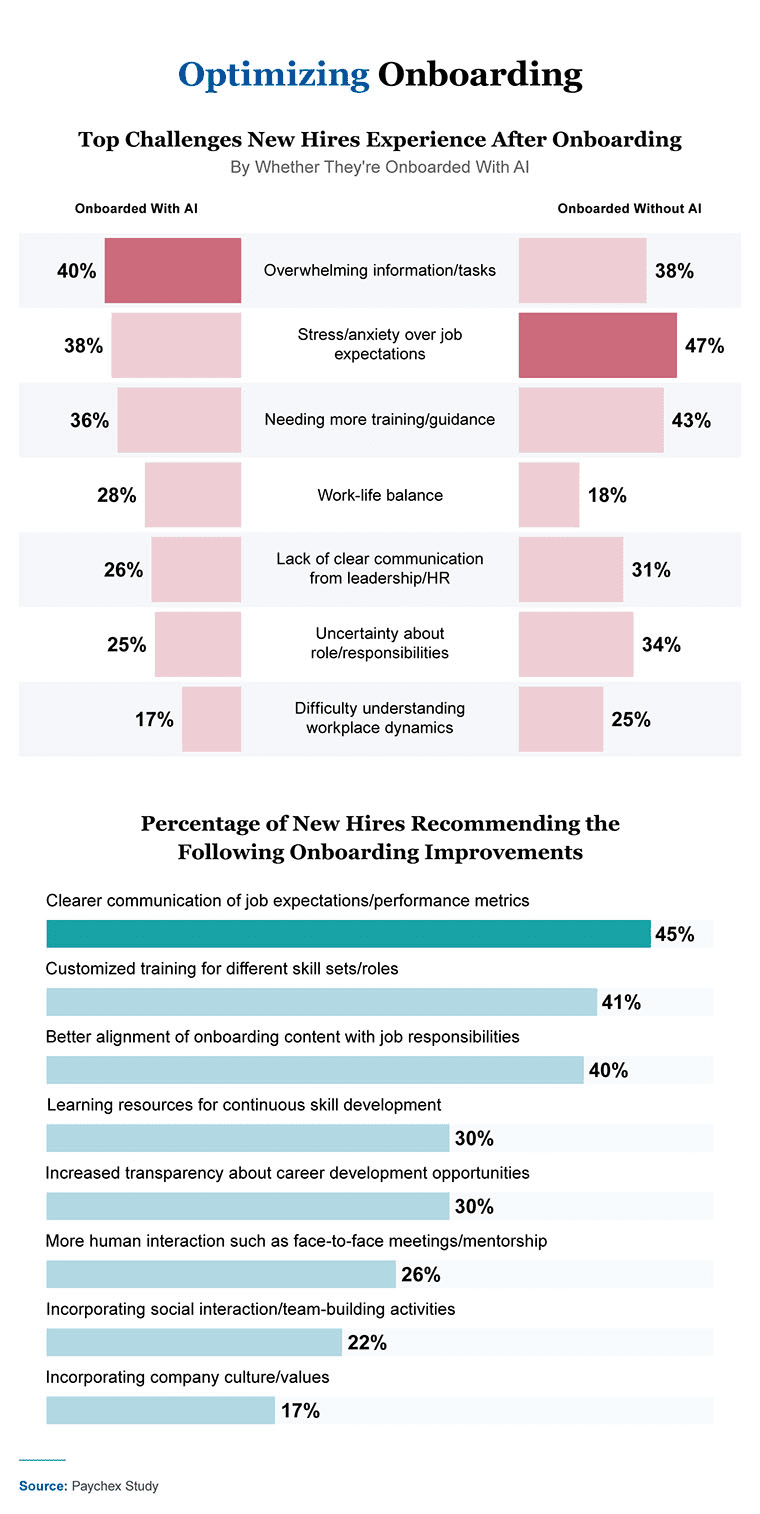
New hires surveyed who were onboarded with AI have experienced certain challenges and identified areas for improvement. While AI has streamlined many onboarding processes, according to HR professionals surveyed, employees can still feel overwhelmed by the information overload during their first few weeks on the job.
Both new hires onboarded with and without AI suggest the need for more transparent communication of job expectations and performance metrics during onboarding (45%), and 35% of those onboarded with AI shared this sentiment. This change could help new employees prepare for future performance reviews. HR professionals can work with hiring managers to better communicate with new hires throughout their onboarding process to set them up for future success.
A similar number of overall new hires (41%) suggest a more personalized training approach addressing individual skills gaps. 33% of surveyed AI-onboarded new hires agree. Another 33% of AI-onboarded employees suggest aligning onboarding content more closely with actual job responsibilities would help improve their onboarding experience.
More human interaction is also an area for improvement, as indicated by surveyed new hires onboarded both with and without AI. This can include face-to-face meetings, mentorship, and career development opportunities. Continuous skill development, aided by on-demand learning resources, is also key to supporting employees’ journeys beyond initial onboarding, noted by 30% of overall new hires and 28% of those onboarded with AI.
HR professionals can improve the onboarding experience by clearly communicating job expectations and performance metrics, including personalized touches, and providing opportunities for increased human interaction.
Onboarding Pros and Cons for HR Leaders
AI tools and machine learning technology can help HR leaders support new employees and save their organization time and money. HR leaders may see significant improvements in aspects like performance management, talent acquisition, and employee engagement. This can aid in data-driven decision-making when HR leaders consider incorporating AI solutions to improve employee recruitment and onboarding processes.
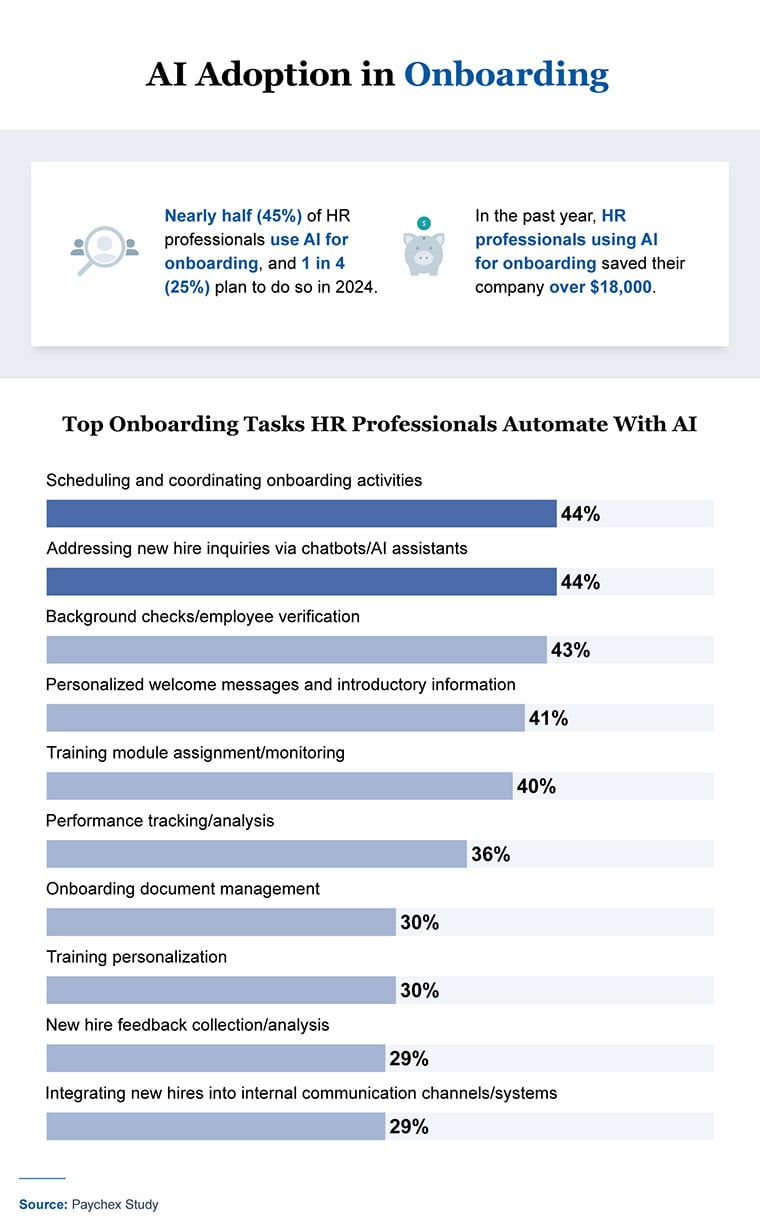
From creating job descriptions, screening potential candidates, and analyzing employee data for talent management, AI technology offers many ways to streamline HR processes, saving HR professionals valuable time. Of those surveyed, 45% of HR professionals already use AI-driven onboarding, while 25% plan to integrate it in 2024. Those already utilizing AI for onboarding reported substantial benefits, including over $18,000 in savings in the past year.
The benefits of using AI in onboarding are not limited to large enterprises. Businesses with 50-99 employees are leading the charge, with 51% already leveraging AI in their onboarding workflows. Businesses with 20-49 employees show the most hesitancy, with 36% indicating no plans to integrate AI in the near future.
The potential use cases for AI in HR are diverse and practical. For those contemplating the adoption of AI systems, these are the top three onboarding tasks HR professionals have improved using AI:
- Paperwork automation. Automating traditionally time-consuming manual workflows saves HR professionals time and resources.
- Chatbots and virtual assistants. Previously approved responses to common questions among new hires are programmed with company policies and procedures.
- Gathering and analyzing feedback. New hires’ experiences can offer valuable insights to improve future onboarding processes.
Customized training programs and ongoing support after onboarding are also valuable AI applications, highlighting how HR pros can utilize AI to help enhance the employee experience.
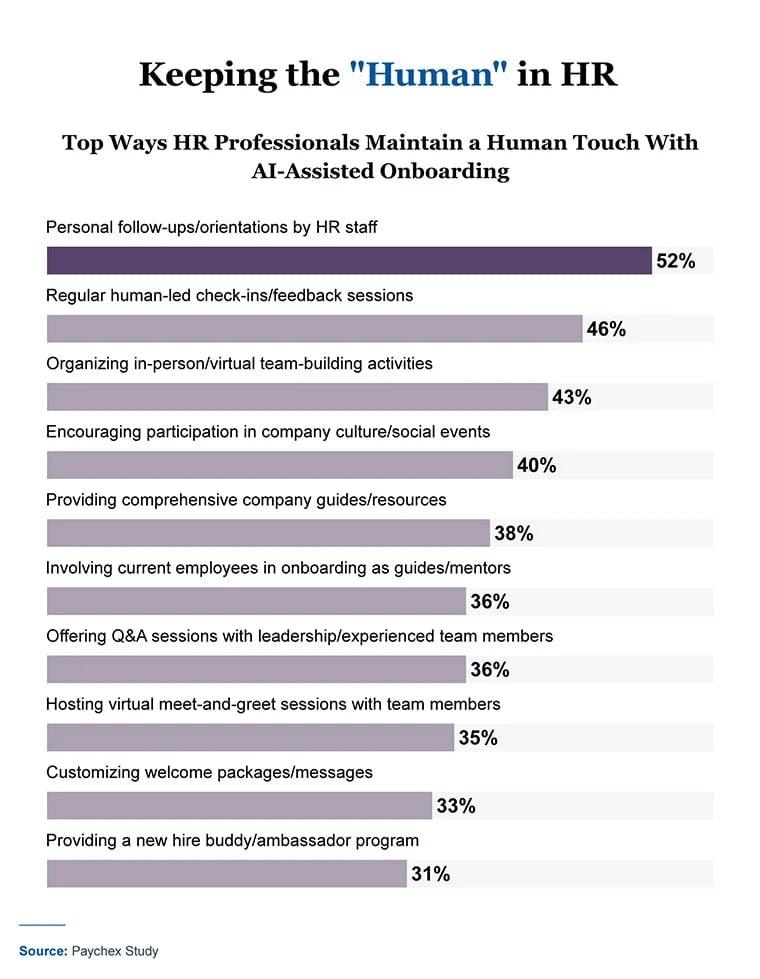
HR professionals are keenly aware of the need to balance tech and human engagement. To maintain a human touch, 52% pair AI-assisted onboarding with personal follow-ups or orientations, 46% regularly conduct in-person check-ins or feedback sessions, and 43% lead team-building activities. This helps HR practices align with employees’ need for increased human interaction throughout onboarding.
HR professionals who have embraced AI for onboarding highlight its most significant benefits:
- 53% report a reduction in onboarding time
- 38% say it decreases associated costs
- 43% note streamlining administrative tasks
- 65% believe AI will improve employee retention
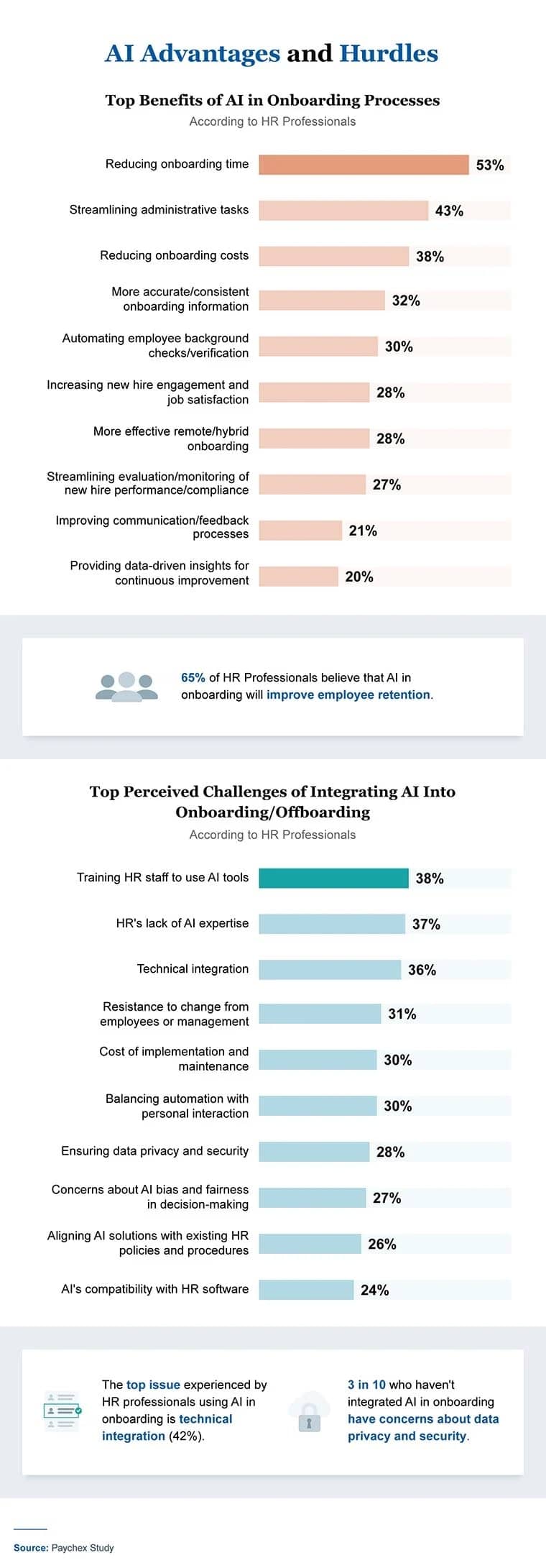
Yet, these advancements come with challenges. For instance, 42% of HR professionals using AI for onboarding cite technical integration difficulties. Partnering early with IT professionals can help HR professionals streamline AI implementation and provide a seamless integration with existing systems and workflows.
For HR departments not yet utilizing AI, 40% of those surveyed attribute the delay to a lack of in-house AI expertise. They believe training HR staff to use AI will be the top challenge in using this technology to enhance their offboarding or onboarding processes.
The gap between recognizing AI’s potential and the ability to implement it shows a need for upskilling and system compatibility within HR teams. Decision-makers may consider investing in targeted training programs and workshops for HR staff to help enhance their skills and confidence in using AI technologies.
Actionable Ways HR Professionals Can Enhance the Employee Experience With AI
- Automate workflows. Use AI to streamline document and form completion and automate chatbot responses.
- Gather and analyze employee feedback. Incorporate it into future onboarding processes.
- Offer post-onboarding support. Survey and implement employee feedback to create a specific post-onboarding plan and ensure consistent communication between new hires and managers.
- Partner early with IT. Help ensure seamless technology integration with existing systems and workflows.
- Attend AI training and workshops. Help enhance your and your team’s confidence in using AI tech.
The Future of HR in Employee Integration
From reducing turnover to ensuring new hires are satisfied and well-prepared, HR professionals are turning to AI to help improve onboarding challenges that new hires often experience. Areas where new hires have identified that onboarding systems fall short offer HR professionals strategic opportunities to pivot toward AI-powered methods to mend the disconnect.
Using AI, HR professionals can set new employee integration standards, prioritizing effective communication and tailored training while maintaining the essential human touch. This approach to HR technology ensures that onboarding becomes a seamless, supportive, and engaging experience, significantly influencing retention rates and employee satisfaction.
Methodology
To explore the role of AI in onboarding and offboarding processes, we surveyed 309 HR professionals on January 16, 2024, and 1,003 recent hires (who started their jobs within the past 12 months) on January 11, 2024.
About Paychex
Paychex is a leading provider of integrated human capital management software solutions for human resources, employee benefits, insurance services, and payroll. Discover how we can support your business at Paychex.com.
Fair Use Statement
Feel free to share the insights from this page for non-commercial purposes, but please give due credit by linking back to this page to provide the full context and information.
For questions or media inquiries, please contact skjean@paychex.com.
Tags







